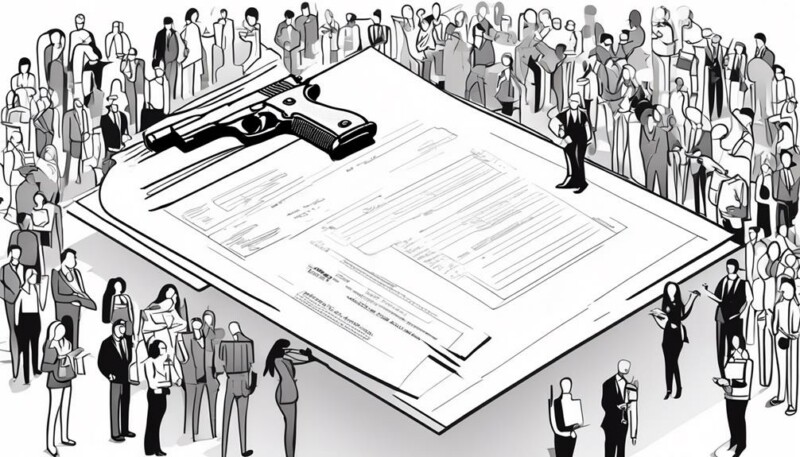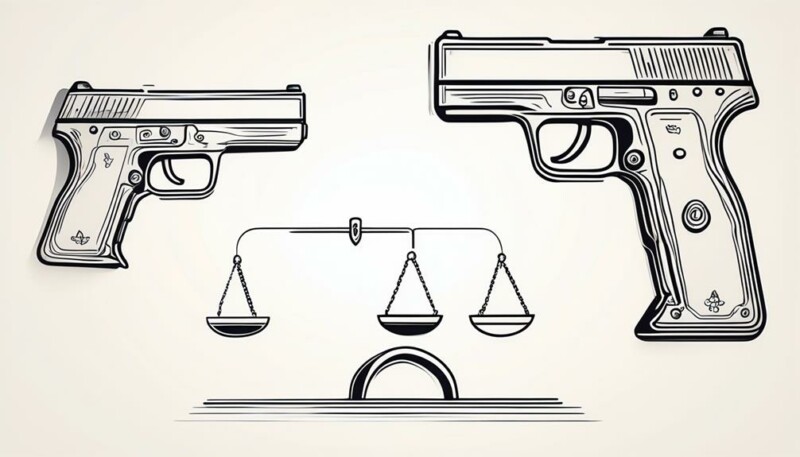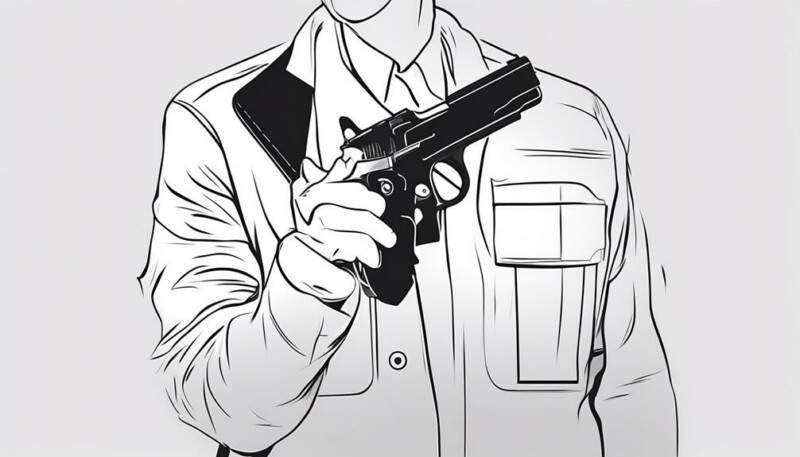Like a double-edged sword, concealed carry laws play a pivotal role in our society, simultaneously offering protection and posing potential risks.
You might be curious to understand why these laws are so important. Well, they're believed to deter crime, allowing law-abiding citizens to defend themselves. Yet, at the same time, they can complicate policing and potentially escalate minor confrontations.
As you navigate this topic, you'll uncover the intricate balance between personal security and public safety concealed carry laws attempt to strike. Will such laws tip the scale in favor of safety or risk?
Let's explore this further.
Key Takeaways
- Concealed carry laws have been linked to a decrease in violent crime rates.
- Obtaining a concealed handgun license involves rigorous background checks, ensuring responsible ownership.
- Americans use firearms for self-defense between 500,000 and 3 million times annually, highlighting the importance of concealed carry laws in empowering individuals to protect themselves.
- Permit holders have successfully intervened in dangerous situations, illustrating the practical benefits of concealed carry laws.
Understanding Concealed Carry Laws

Grasping the intricacies of concealed carry laws is essential, as these regulations have been linked to reduced rates of violent crime, including murders, rapes, aggravated assaults, and robberies. When you carry a concealed handgun, you're exercising your Right to Carry, a privilege that requires a license to carry. Obtaining this license involves rigorous background checks, ensuring firearm safety is maintained.
The issuance of handgun licenses plays a critical role in public safety. Rates of permits are directly connected to a decrease in murder rates, demonstrating the positive influence of concealed carry laws. You, as a permit holder, can potentially intervene in dangerous situations, possibly averting mass catastrophes and saving lives.
However, it's not just about public safety. Concealed carry laws can empower you, making you feel less dependent on the state for personal protection. But while these laws have obvious benefits, their impact on the overall violent crime rates remains a contentious issue. It's essential for gun owners to obtain a comprehensive understanding of these gun laws, balancing rights with responsibilities to promote safety.
Regulations for Carrying Concealed Firearms
When it comes to concealed carry, understanding the regulations is paramount for ensuring both your safety and the safety of those around you. The regulations for carrying concealed firearms can vary, but they're crucial to uphold the right to bear arms responsibly and ensure public safety.
The concealed carry laws are designed to provide a framework for exercising your right to carry a handgun for self-defense. They're also tailored to promote gun safety. Here are some key regulations:
- To carry a concealed firearm, you'll need a concealed handgun license. This license is proof that you've met all federal and state requirements.
- Firearm under federal law is regulated, and not everyone is eligible to carry.
- Some states require gun owners to undergo background checks and training.
- Carry license renewal is often required, with the interval varying by state.
- Certain areas, like schools or government buildings, are often off-limits for concealed carry.
Impact of Concealed Carry Laws

Having understood the regulations for carrying concealed firearms, let's now explore the significant impact these laws have on society and individual safety.
Concealed carry laws are often associated with a drop in violent crimes. When you, as an individual, are legally permitted to carry a concealed handgun, potential criminals may think twice about their actions, knowing they could encounter armed resistance.
In the case of Texas law, a shall-issue jurisdiction, the impact of concealed carry laws is evident. As more citizens obtain a license to carry, it's been linked to reducing murder rates, indicating a potential positive influence on public safety.
Additionally, concealed carry laws have saved countless lives. Americans use firearms for self-defense between 500,000 and 3 million times annually. Permit holders have successfully intervened in dangerous situations, preventing potentially catastrophic events.
In essence, concealed carry laws empower individuals and contribute to public safety. Yet, it's essential to remember that these laws require responsible usage. After all, the goal is to enhance individual safety and societal harmony, not to incite fear or violence.
Concealed Carry Vs Open Carry
Let's delve into the debate between concealed carry and open carry, each having its own merits and considerations when it comes to personal safety and exercising Second Amendment rights.
When you ponder concealed carry vs open carry, it's important to consider the distinct advantages and drawbacks of each.
Concealed carry allows you to carry a weapon discreetly. This method provides an element of surprise, enhancing personal safety. To carry a concealed weapon, you may need a handgun permit, depending on your state's laws.
Open carry means you're openly carrying a firearm for everyone to see. This can serve as a deterrent to criminals but may also draw unwanted attention. It may require a different permit or none at all.
Carrying a handgun openly can demonstrate your Second Amendment rights. However, it can also lead to public unease and potential legal complications.
Regardless of your choice, firearm training is crucial. It ensures you can handle and use your firearm effectively and responsibly.
Acquiring a Concealed Carry Permit

After deciding between concealed carry and open carry, your next step is to understand the process of acquiring a concealed carry permit. You must meet the eligibility requirements set by state laws. You must be at least 21 years old, with no prior felony convictions or certain misdemeanors. Departments like the Texas Department of Public Safety are responsible for issuing these permits.
You'll need to undergo background checks and complete Firearms Training to demonstrate your proficiency. This training ensures that license holders possess the necessary skills and knowledge to safely and responsibly carry concealed firearms.
Once you've met all requirements, you'll submit your application and required documentation. You'll also need to renew your permit within the state's designated timeframe to maintain your legal authorization for possessing a handgun.
Understand that laws on people carrying concealed weapons can vary greatly, especially considering the reciprocity agreements between states. These agreements allow license holders from one state to carry concealed in another. States with shall-issue laws must grant permits to applicants who meet all the legal requirements, further emphasizing the importance of understanding and following your state's process for acquiring a concealed carry permit.
Frequently Asked Questions
Why Should Americans Have Concealed Carry Permits?
Concealed carry permits are crucial for you as an American citizen. They empower you to defend yourself, potentially reducing crime rates such as murder, rape, and assault. You're not just protecting yourself, but potentially aiding law enforcement in dangerous situations.
With a permit, you're part of the hundreds of thousands to millions of Americans who use firearms for self-defense yearly, even possibly preventing mass killings.
What Is a Good Reason for Ccw?
Concealed carry laws are crucial for your personal safety. They allow you to defend yourself when police aren't present. You're not just a bystander but a potential deterrent to crime.
It's estimated that firearms are used for self-defense up to 3 million times a year. Also, CCW permit holders have often intervened in situations that might've led to mass killings.
Your right to carry concealed ensures you're never defenseless in the face of danger.
Is Concealed Carry Legal in Texas Without a License?
Yes, concealed carry is legal in Texas without a license. As of September 1, 2021, you're allowed to carry a handgun concealed on your person without needing a special permit.
Does the 2nd Amendment Protect Concealed Carry?
Yes, the 2nd Amendment does protect concealed carry. Several court rulings, including the 7th and 9th Circuit Courts of Appeals, have affirmed this.
These laws empower you, allowing you to protect yourself and potentially intervene in dangerous situations. However, they're not without controversy, with some fearing they may lead to an escalation of violence.
It's essential to understand the laws in your state and train responsibly.
Conclusion
In a nutshell, concealed carry laws are a double-edged sword. They can deter crime and empower individuals, but also potentially escalate conflicts and pose risks to law enforcement.
It's not a black and white issue, but one that requires careful thought and balance.
So, it's important for you to stay informed and participate in the conversation. After all, these laws play a crucial role in shaping our society's safety and individual freedoms.
